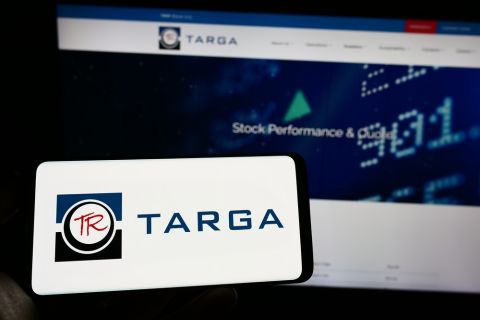Sam Smith's meeting with rating-agency representatives recently wasn't his first time at that table. But it was his first time to present an unrated company. And, this was while rating agencies are under extra pressure-post-Enron, WorldCom et al.-to apply the most correct assignment to each company. "They were tough," says Smith, the chief financial officer of four-year-old Fort Worth-based Encore Acquisition Co. "But they were fair and they were very thorough...We got the rating in the range we thought we would." Encore received a B2 on its senior subordinated debt, and a positive outlook, from Moody's. The CFO of another, long-rated E&P company says it's tough to get an upgrade right now. But Louis Baldwin, CFO for Fort Worth-based XTO Energy Inc., can disagree. "It can be done," he says. XTO won upgrades this spring from S&P and Moody's. Its senior unsecured is now rated Ba2 by Moody's. "If you're still doing the right things, you can get an upgrade," Baldwin says. XTO's public debt is now within one notch of investment-grade status. Moody's reported that it likes XTO's strong hedging program, production and reserve gains, expertise in core areas and that it operates 94% of its properties. With its upgrade, XTO placed $350 million of senior notes at 7.5%. The proceeds were used to redeem $125 million of 9.25% notes, reduce some bank debt and make $164 million of property acquisitions. Meanwhile, with its new rating, Encore placed $150 million of 10-year, senior subordinated debt at 8.37%, which Smith says is a comfortable interest rate, especially for a first-time offering. The net proceeds of about $146 million were used to retire a credit facility, and Encore signed a new $300-million one with Fleet National Bank. Less than $10 million has been drawn on it. Smith says the amount is plenty of capacity for the company, which has an acquire-exploit strategy. Moody's reported that it likes Encore's seasoned management, its ability to buy mature properties at competitive costs and that it operates 86% of its properties. On the other side of the table, the job of rating debt has become tougher, says Raymond McDaniel, Moody's president. It's more complicated by all the derivatives, hybrid securities and off-balance-sheet structures. "There is a growing expectation that rating agencies should have the ability and responsibility to look more comprehensively behind the numbers," he says. "Recent disclosures of questionable accounting practices and the increasing number of accounting restatements have undermined investor confidence, even in companies with solid practices." In response, Moody's is expanding its research and analysis. Not all E&P companies are passing the tests. • Moody's has a negative forecast on Unocal's long-term debt, which is presently Baa1. The agency's analysts think Unocal has a lot of debt-compared with its profitability-and it may continue to climb in order to grow production. Unocal's Gulf of Mexico fields are in decline and "the company currently has no specific debt-reduction strategy," the agency reports. • Fitch Ratings has downgraded Anadarko Petroleum's senior unsecured to BBB+ from A- due to higher debt resulting from acquisitions and a lack of production growth so far this year. • Moody's downgraded Mission Resources' senior notes to Caa1, which is junk, from B3 due to eroding asset coverage and production potential. • And, it downgraded Southwestern Energy's senior unsecured to Ba2 from Baa3 because E&P is playing a larger role in the part-utility company's financials. In 2001, E&P contributed 84% of operating income and 80% of cash flow, and it consumed 93% of capital. Moody's is concerned with the risks of growing an E&P company in mature U.S. basins in which Southwestern operates. While increased disclosure and transparency contribute to heightened capital-markets interest in stocks-and thus improved stock prices-stricter credit-rating standards can only improve investment quality. Investors should know, though, that E&P companies have already gone through their own Enron (the 1980s), and more than once. Those in business today have already passed many important tests, the most recent being the bust of 1998-99 and the boom-even good times can go bad, when miscalculated-of 2001.
Recommended Reading
Tallgrass Declares Open Season for CO2 Transport Pipeline
2024-05-06 - Tallgrass Energy’s Trailblazer project, originally a natural gas pipeline, would move greenhouse gas from Nebraska and Colorado and store it in geological formations in Wyoming.
Targa Expects Another Major Permian Pipeline Project This Year
2024-05-03 - Targa Resources says different projects are falling in place for gas capacity expansion
US Appeals Court Upholds FERC Approvals for Gas Pipeline Expansion
2024-05-02 - A unanimous three-judge panel of the U.S. Circuit Court of Appeals for the D.C. Circuit held that the Federal Energy Regulatory Commission was right to determine the Evangeline Pass Expansion project is functionally separate from four related gas infrastructure developments.
Enterprise Targets FID for SPOT Project by End of 2024
2024-05-01 - Enterprise Products Partners’ co-CEO disputed capex figures reported in the media regarding its Sea Port Oil Export Terminal.
US Reforms Green Law to Speed Clean Energy, Infrastructure Permits
2024-04-30 - The reforms are the second and final phase of adjustments to the National Environmental Policy Act, or NEPA, by the Biden administration.



